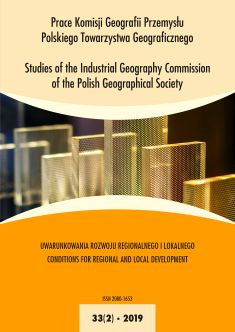Adult Education as a Factor Increasing the Innovativeness of European Union Countries
DOI:
https://doi.org/10.24917/20801653.332.2Keywords:
adult education, formal education; innovativeness, non-formal educationAbstract
The concept of a knowledge-based economy assumes that knowledge is the main factor of socio- economic development and the formation of new economic structures. Knowledge is necessary to generate and implement innovations in their broad sense. Knowledge acquired as a result of formal education quickly becomes outdated or insufficient, hence the need for continuous learning. Continuing education includes all the forms of learning that are pursued subsequent to the completion of initial education and training. It is implemented in three forms: formal, semi-formal and informal. The aim of the study is to verify whether the growing popularity of continuing education in the EU member countries is reflected by changes in the level of innovation. The methods used to achieve the study goal included critical review of literature, analysis of the existing statistical data and comparative analysis. The continuing semi-formal and informal education implemented in the form of training sessions and courses that lead to obtaining qualifications recognised within the specific institution (workplace, organisation, etc.) is an important factor determining the level of innovation in the economy. Countries where a significant proportion of labour force is involved in lifelong learning achieve a higher level of innovation than those where this aspect of educational activity is undervalued.
Downloads
Metrics
References
Borowiec, M., Dorocki, S., Jenner B. (2009). Wpływ zasobów kapitału ludzkiego na kształtowanie społeczeństwa informacyjnego i innowacyjności struktur przemysłowych. Prace Komisji Geografii Przemysłu Polskiego Towarzystwa Geograficznego, 13, 95–109.
Decyzja Parlamentu Europejskiego i Rady nr 1350/2008/WE z 16 grudnia 2008 r. dotycząca Europejskiego Roku Kreatywności i Innowacji (2009). Dziennik Urzędowy Unii Europejskiej z 24 grudnia 2008 r. Pozyskano z https://eur-lex.europa.eu/legal-content/PL/TXT/ PDF/?uri=CELEX:=154&from=EN
Dorośli w systemie edukacji formalnej: polityka i praktyka w Europie (2011). Agencja Wykonawcza ds. Edukacji, Kultury i Sektora Audiowizualnego (EACEA). Warszawa: Fundacja Rozwoju Systemu Edukacji.
Dziechciarz, J. (2015). Pomiar i wycena wiedzy, umiejętności i kompetencji nabytych w formalnych i nieformalnych formach kształcenia. W: P. Wdowiński (red.). Nauczyciel akademicki wobec nowych wyzwań edukacyjnych. Łódź: Wydawnictwo Uniwersytetu Łódzkiego.
European Innovation Scoreboard 2018 (2018). Pozyskano z https://www.interregeurope.eu/ policylearning/news/3806/european-innovation-scoreboard-2018/
Foley, A. (2004). Dimensions of Adult Learning. Adult education and training in a global era. Open University Press.
Fuente, de la A., Ciccone, A. (2003). Human Capital in a Global and Knowledge‑based Economy. Paris: European Commission.
International Standard Classification of Education ISCED 2011 (2018, 7 listopada). UNESCO Institute for Statistics, Montreal, Canada 2012. Pozyskano z http://uis.unesco.org/sites/default/ files/documents/international-standard-classification-of-education-isced-2011-en
Kształcenie dorosłych (2009). Departament Pracy i Warunków Życia. Informacje i opracowania statystyczne. GUS: Warszawa.
Lee, S.Y., Florida, R., Acs, Z. (2004). Creativity and Entrepreneurship: a Regional Analysis of New Form Formation. W: Discussion Papers on Entrepreneurship, Growth and Public Policy. Jena: Max Planck Institute.
Making a European Area of Lifelong Learning a Reality. Komunikat Komisji Europejskiej, COM (2001) 678. Pozyskano z https://eur-lex.europa.eu/LexUriServ/LexUriServ.do?uri=- COM:2001:0678:FIN:EN
Narasaiah, M.L. (2007). Education and Economic Development. New Delhi: Discovery Publishing Hause.
Rosenbladt, B. (2009). Adult education and training in comparative perspective – understanding differences across countries. Monachium: TNS Infratest Sozialforschung.
Tudor, S.L. (2013). Formal Non-formal – Informal in Education. Procedia – Social and Behavioral Sciences, 76, 821–826.
Ujwary-Gil, A. (2004). Inwentyka, czyli kreatywność w biznesie. Wybrane zagadnienia. Nowy Sącz: Wyższa Szkoła Biznesu – National-Louis University.
Węgrzyn, G. (2011). Sektor usług – zmiany w zatrudnieniu i innowacyjności. Prace Naukowe Uniwersytetu Ekonomicznego we Wrocławiu, 168(2), 363–376.
Węgrzyn, G. (2015). Wykształcenie i kwalifikacje pracowników jako determinanta zmian w poziomie innowacyjności gospodarek. Ekonomia XXI Wieku, 1(5), 90–100.
Downloads
Published
How to Cite
Issue
Section
License
Articles are published under the terms of the Creative Commons License (CC BY-ND 4.0; Attribution– NoDerivs).

